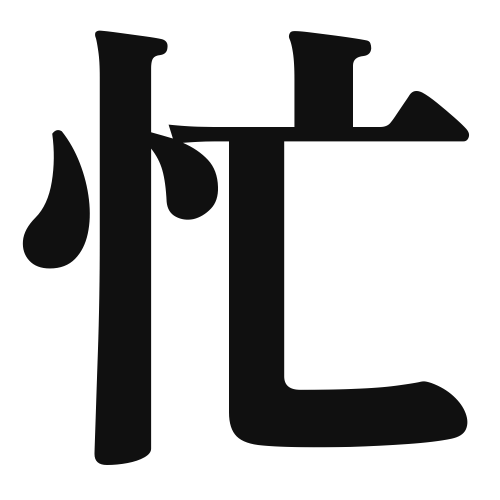1. Overview of Meaning
The kanji “忙” (pronounced “bō” in Japanese) means “busy” or “occupied.” It conveys a sense of being engaged in many activities or tasks, often implying a lack of free time.
2. Formation and Radical
Formation of the Kanji: The kanji “忙” is a compound character that combines elements to convey its meaning. It consists of the radical for “heart” (心) and the character for “death” (亡), suggesting that being busy can lead to a troubled heart or a sense of urgency.
Radical: The radical of “忙” is 心 (heart), which often relates to emotions and feelings in various kanji.
3. Examples of Usage
Common Words and Phrases:
- 忙しい (いそがしい, isogashii) – busy
- 忙しさ (いそがしさ, isogashisa) – busyness
Example Sentences in Daily Conversation:
- 今週はとても忙しいです。 (こんしゅうはとてもいそがしいです。) – I am very busy this week.
- 忙しい時期が終わったら、旅行に行きたいです。 (いそがしいじきがおわったら、りょこうにいきたいです。) – I want to travel after the busy season is over.
4. Synonyms and Antonyms
Similar Kanji:
- 多忙 (たぼう, tabou) – extremely busy; implies a higher level of busyness.
- 急 (きゅう, kyuu) – urgent; suggests a need for quick action.
Antonyms:
- 暇 (ひま, hima) – free time; indicates a lack of busyness.
- 余裕 (よゆう, yoyuu) – leeway; suggests having extra time or space.
5. Cultural and Historical Background
Relation to Japanese Culture: In Japanese culture, being busy is often seen as a virtue, reflecting dedication and hard work. However, it can also lead to stress and the need for balance in life.
Proverbs and Idioms:
- 忙中閑あり (ぼうちゅうかんあり, bōchūkanari) – “Even in the midst of busyness, there is leisure.” This proverb suggests that one should find time to relax, even when busy.
